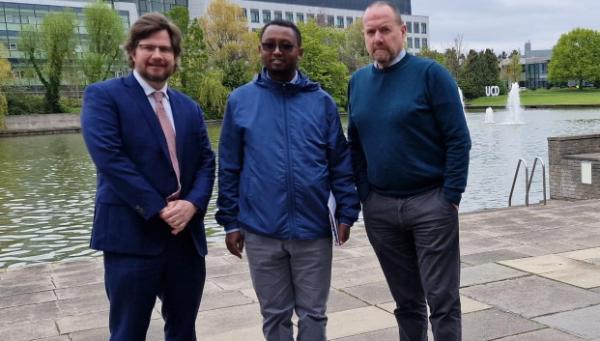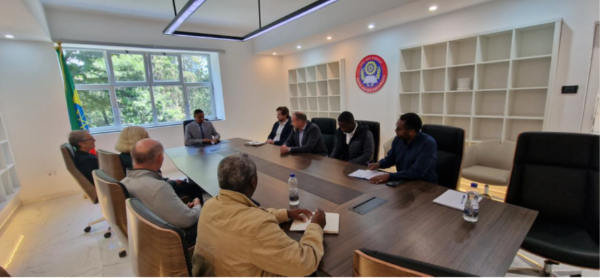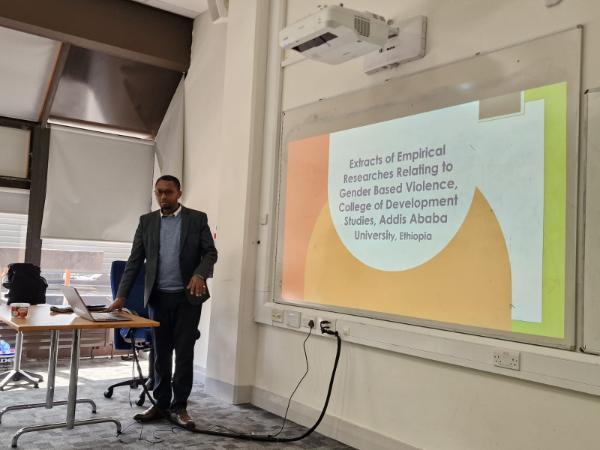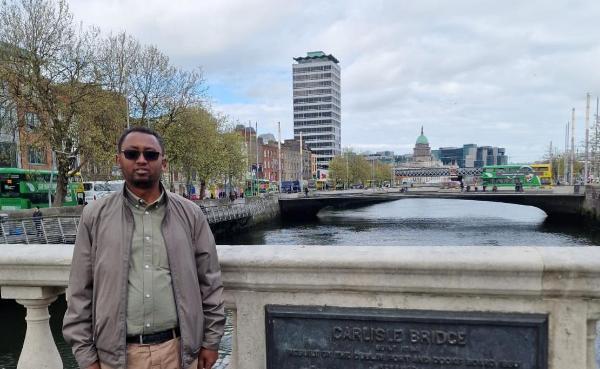
In this dual perspective blog, Professor Pat Gibbons, Director of UCD’s Centre for Humanitarian Action, and Dr Tesfaye Zeleke of Addis Ababa University talk about how their Erasmus+ funded project is paving the way for a new approach to humanitarian education in Sub Saharan Africa.
The View from Dublin: Professor Pat Gibbons, Director of UCD's Centre for Humanitarian Action
Humanity is a core principle that governs our work with disaster-affected populations for staff and students at UCD’s Centre for Humanitarian Action. A key part of this is that we learn what is socially and culturally acceptable from our local partners.
The humanitarian endeavour is frequently driven by notions of pity or charity and has overlooked critical local capacity and knowledge. Yet we know that local input – or localisation - can be transformative to the success of projects. That traditional one-size-fits-all approach driven by wealthier donors in the global North has been found wanting. The localisation of humanitarian action is now a core challenge for all humanitarian stakeholders as vulnerability and fragility grows all across the world due to climate change, geopolitical struggles, protracted disasters and associated migration.

But for that shift to localisation to happen, there is a need to engage respectfully with local experts in supporting locally delivered education and training. Globally, Ethiopia is one of the leading recipients of humanitarian aid and yet currently there are virtually no university-level programmes to train current and future humanitarian practitioners.
It was around this need for local humanitarian action education provision that the UCD Centre for Humanitarian Action developed a bid for Erasmus+ KA171 funding in 2022. The project concept was that by working with peer universities in disaster-affected countries, the UCD Centre for Humanitarian Action could search out complementary local expertise and capacities to enhance efficacy and maximise humanitarian impact. The plan was to work collaboratively with the University Of Ghana (UG) and Addis Ababa University (AAU) to co-design and deliver localised humanitarian action modules.
Now part way through the project, we’ve made strong headway to realising that goal. Sharing our UCD Centre for Humanitarian Action course design as the starting point, we have been tailoring modules to the local context, working closely with stakeholders and educators on the ground.
So far, we have had a very positive response to the project in both Accra and Addis Ababa. During my recent visit to Addis, more than 100 university staff and students and NGO representatives attended a single seminar session. There has also been significant engagement and interest from senior stakeholders: I’ve met with Nicola Brennan, Irish Ambassador to Ethiopia; Fergal Ryan, the Head of Development at the Irish Embassy; and Rita Amukhobu, Head of Humanitarian Affairs at the African Union for Humanitarian Action.
The value of a rich partnership between AAU and UCD to support localisation of humanitarian education is obvious: AAU develops the capacity to provide localised education and training for staff delivering aid, while UCD benefits by enriching the experience of its staff and students and expanding the global nature of its education.
The View from Addis: Dr Tesfaye Zeleke, Associate Professor in Development Studies at Addis Ababa University

The fact that Ethiopia is located in the horn of Africa, where the need for humanitarian assistance is severe and growing, underlines the importance of this area of work. The localization of humanitarian programmes is actively enabling development agencies and Higher Education Institutions in Ethiopia, including Addis Ababa University, to design systems and processes that will enable us to enhance the way we locally deliver humanitarian assistance to those most in need.
By involving local actors, the localization of humanitarian programmes seeks to increase the effectiveness, efficiency and sustainability of aid efforts, as well as promote the accountability and ownership of affected communities. Through appropriately designed programmes, research and community service channels, we are moving towards this.
Having worked closely with Prof Gibbons and Dr Dejen Gonfa during their time in Addis Ababa, I had the opportunity to visit UCD in April 2024 as a result of the Erasmus+ funding available through the project. Having that time in Dublin in person was valuable as it enabled us to solidify the progress we had made around customising the localisation module for the Ethiopian context and streamlining the way it will be delivered.

I also had the opportunity to directly engage UCD students in discussion on gender-based violence and resilience-building as well as the internationalisation and localisation of humanitarian activities. I presented Ethiopian case studies, for example, on gender-based violence in the floriculture and banking sectors in Ethiopia, and was impressed by the UCD students’ practical and interested approach. It struck me that the advanced teaching and learning infrastructures and facilities at UCD would help the institutionalization of humanitarian programmes; for me, it emphasised the need for more investment into education in Ethiopia.
I also had the opportunity to have some valuable conversations with key members of staff within UCD on what this project could lead to – for example, the establishment of a joint programme in the area of humanitarian education, by way of cascading the humanitarian programme at Addis Ababa University.
UCD’s Africa Engagement Strategy would definitely create a lot of opportunities at my home institution, as it has many synergies with the five-year strategic goal of AAU on its efforts towards internationalization. I believe that my visit, and those still to take place through this project, has done much to strengthen the existing partnership between UCD and AAU.
Find out more about Erasmus+ ICM exchange
- Find out more about UCD's Africa Engagement Strategy.
- Professor Pat Gibbons and Professor Tesfaye Zeleke undertook Erasmus+ staff teaching and training mobility periods funded under the Erasmus+ Key Action 171 programme (formerly known as Erasmus+ International Credit Mobility).
- Erasmus+ KA171 is an EU-funded programme which creates opportunities for academics or professional staff to develop bespoke mobility projects focused on a specific area of expertise. Projects include student or staff mobility periods with
partner countries. This funding stream enables UCD to partner with third countries not associated with the Erasmus+ programme (broadly speaking, non-EU countries). - Professor Pat Gibbons is the Director of UCD’s Centre for Humanitarian Action, UCD. Professor Tesfaye Zeleke is a professor of Development Studies at Addis Ababa University, Ethiopia.
Funding for the three-year project was awarded in 2022 by the Higher Education Authority, Ireland's Erasmus+ National Agency, to support the academic mobility of students and staff between the two institutions. - Between 2015 and 2023, UCD obtained almost €1.5 million in KA171 funding to support the academic mobility of 340 students and staff between Ireland and 32 partner countries worldwide.
Find out more about Erasmus+ ICM projects or contact (opens in a new window)erasmusicm@ucd.ie
Photo captions
- L-R: Mike Talbot (UCD Global), Tesfaye Zeleke and Pat Gibons
- Pat Gibbons meeting with stakeholders at Addis Ababa University during his mobility
- Tesfaye Zeleke presenting during his mobility in Dublin
- Tesfaye during his mobility in Dublin